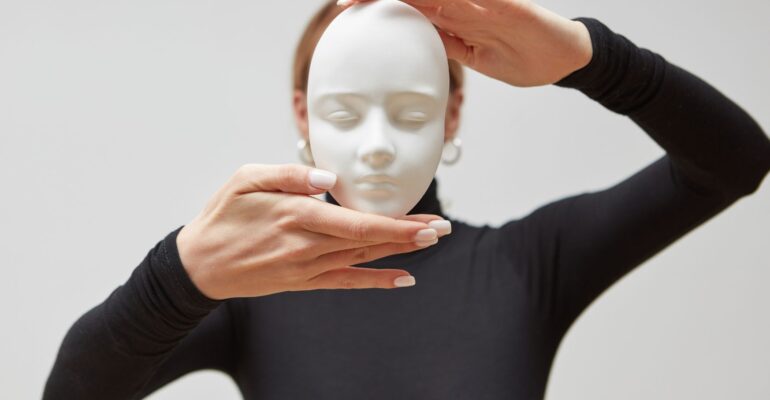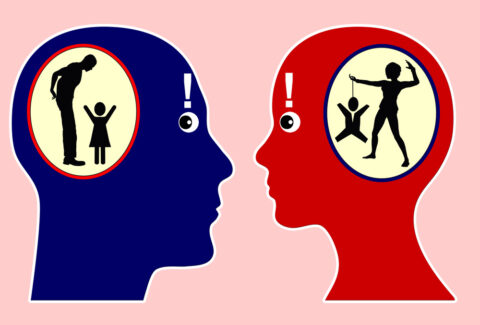Taking Off the Mask
The Transformational Power of Transactional Analysis Therapy
We all wear masks. Some are smiling, some are strong, some are silent. Some are crafted so carefully that even we forget they’re not our true face. We wear them to protect, to belong, to perform, to hide. But eventually, the mask becomes heavy. It blurs the lines between who we are and who we were told to be. And without knowing it, we begin to live someone else’s story.
Transactional Analysis[1] Therapy (TA) offers us a mirror and a map. It helps us see the mask for what it is:
- A survival tool.
- A social costume.
- A story we didn’t write, but one we can choose to end.
The Mask: A Script in Disguise
From childhood, we learn how to be acceptable, lovable, safe.[2] We shape ourselves based on unspoken rules and messages[3]:
- “Be perfect.”
- “Don’t feel too much.”
- “Don’t need anyone.”
- “Make others happy before yourself.”
We absorb these messages not as suggestions, but as commandments. And over time, we weave them into a life script—a silent, unconscious narrative that defines how we see ourselves, others, and the world.
The mask is not random. It is the visible expression of our internal script. It reflects the ego state we’ve learned to live in.
- The Critical Parent[4] mask says: “I must be in control. I must be right.”
- The Adapted Child[5] mask says: “I’ll do whatever it takes to be loved.”
- The Free Child mask may be hidden beneath layers of shame, waiting for permission to play, to speak, to dream.[6]
But behind every mask is a person—aching not to be perfect, but to be real.
Transactional Analysis: The Therapy of Truth
TA doesn’t rip off the mask. It invites us to gently, courageously remove it.
It starts with awareness:
- Who am I being right now?
- Which ego state is driving me?
- Is this voice mine—or someone else’s?
In TA, we learn to recognize the difference between:
- The Parent voice that echoes judgment or protection.
- The Child voice that feels joy, fear, or compliance.
- The Adult voice that chooses—calm, clear, conscious.
With each session, we learn to hear our real voice again.
Why We Wore the Mask
The mask wasn’t weakness.[7] It was wisdom. We wore it to:
- Keep the peace.
- Avoid rejection.
- Gain approval.
- Stay safe in a world that didn’t know how to hold our truth.
But what once protected us now imprisons us. We forget that we have the right to be whole, human, and free. We forget that vulnerability is not weakness—it is the door to intimacy. TA therapy helps us remember.
Taking Off the Mask: The Process of Reclaiming Self
- Naming the Roles We Play: We look at the roles we fall into again and again—the Pleaser, the Achiever, the Rebel, the Caretaker—and ask:
- Who told me I had to be this to be loved?
- What part of me is still hiding behind this performance?
- Identifying Script Beliefs[8]: With the therapist’s guidance, we unearth beliefs like:
- “I am only valuable if I succeed.”
- “My needs don’t matter.”
- “If I show my true feelings, I’ll be rejected.”
And then—we challenge them. We update them. We choose new beliefs, written by our Adult self, not our wounded past.
- Practicing Authentic Transactions: TA helps us shift from Crossed transactions (where the mask speaks) to Complementary Adult-to-Adult communication (where the real self shows up). We learn how to speak without performing. Listen without defending. Love without pretending.
The Freedom of No Longer Pretending
When we take off the mask, something beautiful happens. We stop needing to impress.
We stop fearing disapproval. We begin to trust that who we are—raw, flawed, feeling—is enough. We begin to live as Creators, not Victims. We offer support as Coaches, not Rescuers.
We challenge with love as Guides, not Persecutors. We stop acting. We start living.
Final Reflection: What Awaits Behind the Mask
Behind the mask is not weakness.
Behind the mask is truth.
And truth is the beginning of healing.
Transactional Analysis Therapy isn’t about fixing what’s broken.
It’s about uncovering what’s already whole—and choosing, again and again, to live from that place.
So if you feel tired of performing…
If you feel unknown even in the company of others…
If you feel like there’s a deeper you waiting to be seen…
Start by asking:
What mask am I wearing right now?
And am I ready to take it off?
You don’t have to do it alone.
TA is the hand that holds yours as you peel it away.
And what remains is not shame.
It is your self—authentic, aware, and finally, free.
Would you like to learn more about Transactional Analysis Therapy?
If so, we invite you to join us for our virtual conference on May 9, 2025, from 9-1pm (EDT) via Zoom, where we will explore the transformative power of TA in greater depth. Together, we will uncover how to help your patients and clients begin living a life led by awareness, choice, and authentic connection.
Come as you are—regardless the awareness!
[1] Solomon, Carol. “Transactional analysis theory: The basics.” Transactional analysis journal 33.1 (2003): 15-22.
[2] Lodge, Sara. “Games leaders play: Using transactional analysis to understand emotional dissonance.” Leadership as Emotional Labour. Routledge, 2012. 192-219.
[3] Steiner, Claude. Scripts people live: Transactional analysis of life scripts. Grove Press, 1990.
[4] Williams, John E., et al. “Construct validity of transactional analysis ego states: free child, adult, and critical parent.” Transactional Analysis Journal 13.1 (1983): 43-49.
[5] Qu, Hongmei. Transforming Parent-Child Relationships: Culturally Adapted Transactional Analysis Curriculum for Positive Parenting Training for Chinese-Speaking Parents in San Francisco Chinatown. Diss. California Baptist University, 2023.
[6] Taher, TizDast, and Jafari Senejani Maryam. “The Effect of Eric Berne’s Transactional Analysis on Parent-Child Conflict.” international journal of philosophy and social-psychological sciences 2.2-2016 (2016): 40-45.
[7] Harris, Thomas A. I’m OK, you’re OK: A practical guide to transactional analysis. Random House, 2013.
[8] Erskine, Richard G. Life scripts: A transactional analysis of unconscious relational patterns. Routledge, 2018.




